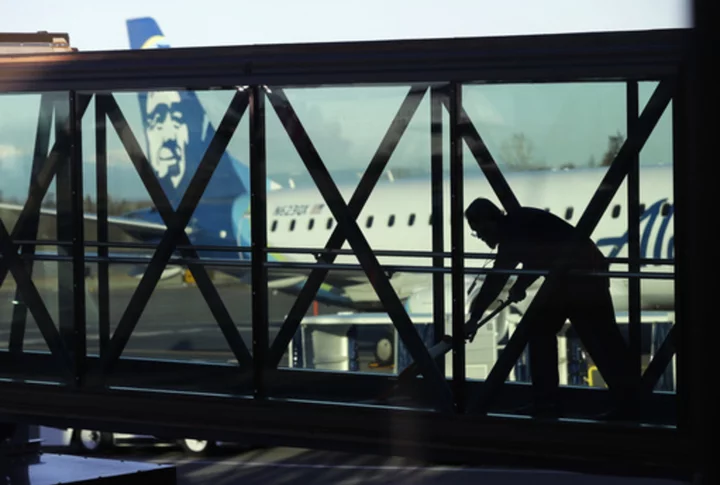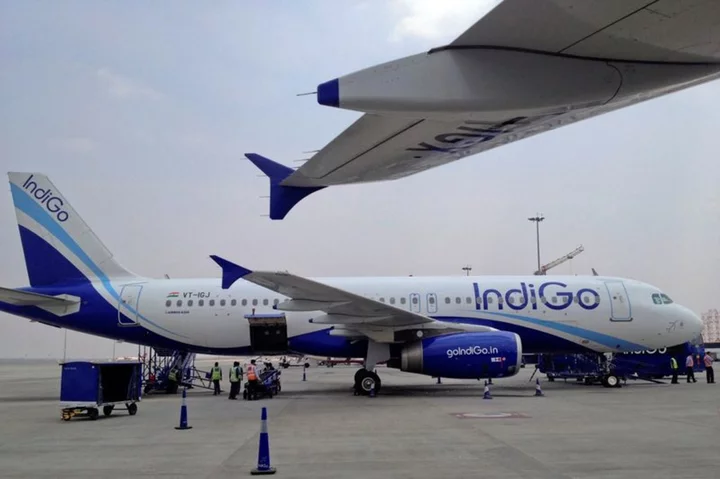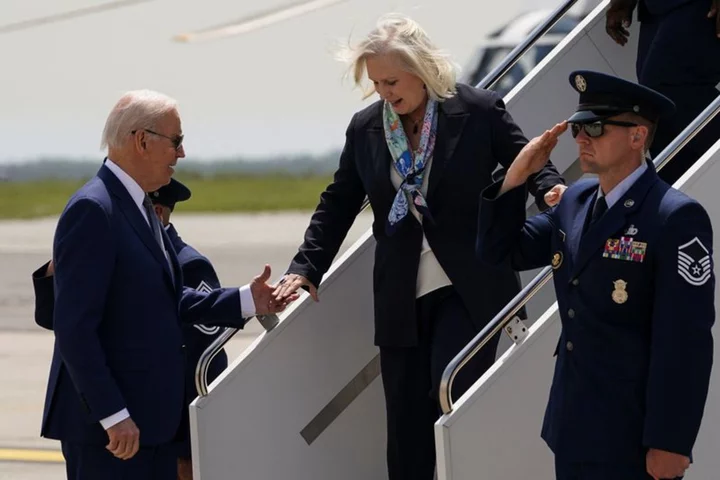PORTLAND, Ore. (AP) — An off-duty pilot riding in the extra seat in the cockpit of a Horizon Air passenger jet tried to shut down the engines in midflight and had to be subdued by the crew, a pilot flying the plane told air traffic controllers.
Authorities in Oregon identified the man as Joseph David Emerson, 44. He was being held Monday on 83 counts each of attempted murder and reckless endangerment and one count of endangering an aircraft, according to the Multnomah County Sheriff’s Office.
The San Francisco-bound flight on Sunday diverted to Portland, Oregon, where Emerson was taken into custody by officers from the Port of Portland. He is to be arraigned Tuesday.
Seattle-based Alaska Airlines, which owns Horizon, a regional carrier, did not name Emerson, but said Monday that the threat was posed by one of its pilots who was off duty but authorized to occupy the cockpit jump seat.
The airline said in a statement that the captain and co-pilot "quickly responded, engine power was not lost and the crew secured the aircraft without incident.” Alaska said no weapons were involved.
One of the pilots told air traffic controllers that the man who posed the threat had been removed from the cockpit and was in handcuffs in the back of the plane.
“We’ve got the guy that tried to shut the engines down out of the cockpit. And he — doesn’t sound like he’s causing any issue in the back right now, and I think he’s subdued," one of the pilots said on audio captured by LiveATC.net. "Other than that, we want law enforcement as soon as we get on the ground and parked.”
Bailey Beck, who was on the flight, described to SFGate the confusion and stress experienced by passengers.
“It was really bizarre because there was no overheard commotion to alert the passengers. The man walked from the cockpit to the back of the plane by himself, where he was then handcuffed to a railing and didn’t make any disturbance from the rear,” Beck told the news outlet.
Sunday’s incident occurred on a Horizon Air Embraer 175 carrying 80 passengers, including children 2 or younger, and four crewmembers. The plane left Everett, Washington, at 5:23 p.m. local time and landed in Portland an hour later. Alaska said passengers continued on to San Francisco on a later flight.
The FBI office in Portland said it was investigating.
The Federal Aviation Administration, in an alert to airlines, said a jump seat passenger tried to disable the engines by deploying the engine fire-suppression system. The agency said it was helping law enforcement investigations, but declined further comment.
FAA records indicate Emerson has a valid license to fly airline planes. Property records show he owns a house in Pleasant Hill, California, about 30 miles (50 kilometers) east of San Francisco. The Associated Press tried but couldn't reach family members.
The Multnomah County sheriff’s office, district attorney’s office and public defender’s office didn't immediately respond to inquiries about whether Emerson had an attorney to comment on his behalf.
John Cox, a retired airline pilot who is now a safety consultant, said it isn't hard to activate the fire handles on a jet. "You want them to be accessible in case of an engine fire,” he said.
He said it's possible to restart the engines once the fire handles are returned to their normal position.
“This is an extremely rare event. In 53 years, I have never heard of a jump seat rider attempting to shut down engines,” Cox said. He said the third pilot can be invaluable in cases where a crew must deal with a complex situation.
Jeffrey Price, an aviation-security expert at Metropolitan University of Denver, said airlines must approve people who sit in the jump seat, but the pilots working the flight can deny access.
The vetting of crew members is based on trust, he said, and the last line of defense is what happened on the Horizon plane — “crew members physically preventing someone from taking over the flight controls. The system worked, fortunately.”
Airlines use the third seat to accommodate pilots who need to get in position to fly a later flight, avoiding the need to bump a passenger off the plane. Many U.S. carriers will let pilots from other airlines occupy the third seat, at least on domestic flights.
“For the amount of times this type of incident happens — almost never — it’s probably not a procedure we need to get rid of,” Price said. He added, however, that Sunday’s quashed threat will lead to an analysis of whether procedures were followed and whether additional safeguards are needed.
Price could recall only one other similar episode — in 1994, when a FedEx pilot who was facing possible termination tried to kill the crew and crash the plane. The crew subdued the hijacker, who was convicted and sentenced to life in prison.
In 2018, a pilot in the jump seat of a Boeing 737 Max operated by Indonesia’s Lion Air emerged as a hero after helping the crew stop the plane’s nose from repeatedly pointing down. Disaster was averted — or delayed until the next flight of the plane, which crashed, killing all 189 people on board.
There have been crashes that investigators believe were deliberately caused by pilots. Authorities said the co-pilot of a Germanwings jet that crashed in the French Alps in 2015 had practiced putting the plane into a dive.
In 2018, a Horizon Air ground agent stole an empty plane at Seattle's Sea-Tac International Airport and crashed into a small island in Puget Sound after being chased by military jets that scrambled to intercept the aircraft. The man told an air traffic controller that he “wasn’t really planning on landing” and described himself as “a broken guy."
___
Koenig reported from Dallas. Associated Press writer Stefanie Dazio in Los Angeles contributed.
___
This story has been updated to correct the website where the pilot audio was captured. It's LiveATC.net, not LiveATC.com.









